| Listing 1 - 10 of 25 | << page >> |
Sort by
|
Book
ISBN: 1443881147 9781443881142 9781443887694 1443887692 Year: 2015 Publisher: Newcastle upon Tyne, England : Cambridge Scholars Publishing,
Abstract | Keywords | Export | Availability | Bookmark
 Loading...
Loading...Choose an application
- Reference Manager
- EndNote
- RefWorks (Direct export to RefWorks)
This book provides a concise and engaging history of classical education in English schools, beginning in 1500 with massive educational developments in England as humanist studies reached this country from abroad; it ends with the headmastership of Thomas Arnold of Rugby School, who died in 1842, and whose influence on schools helped secure Latin and Greek as the staple of an English education. By examining the pedagogical origins of Latin and Greek in the school curriculum, the book provides historical perspective to the modern study of Classics, revealing how and why the school curriculum de
Classical education --- Education, Classical --- Education --- Education, Humanistic --- Humanism --- Humanities --- History.
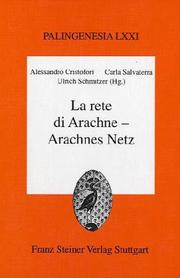
ISBN: 3515078215 9783515078214 Year: 2000 Volume: 71 Publisher: Stuttgart Steiner
Abstract | Keywords | Export | Availability | Bookmark
 Loading...
Loading...Choose an application
- Reference Manager
- EndNote
- RefWorks (Direct export to RefWorks)
Classical education --- Civilization, Classical --- Computer network resources. --- -Classical education --- -Education, Classical --- Education --- Education, Humanistic --- Humanism --- Humanities --- Classical civilization --- Civilization, Ancient --- Classicism --- Computer network resources --- -Computer network resources --- Education, Classical --- Classical education - Computer network resources. --- Civilization, Classical - Computer network resources.
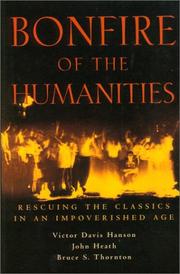
ISBN: 1882926544 9781882926541 Year: 2001 Publisher: Wilmington ISI books
Abstract | Keywords | Export | Availability | Bookmark
 Loading...
Loading...Choose an application
- Reference Manager
- EndNote
- RefWorks (Direct export to RefWorks)
Education, Humanistic --- Classical education --- Education, Classical --- Education --- Humanism --- Humanities --- Education, Humanistic - United States. --- Classical education - United States.
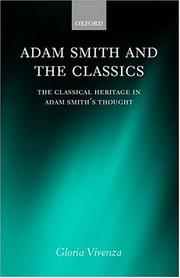
ISBN: 0198296665 9780198296669 Year: 2001 Publisher: Oxford Oxford university press
Abstract | Keywords | Export | Availability | Bookmark
 Loading...
Loading...Choose an application
- Reference Manager
- EndNote
- RefWorks (Direct export to RefWorks)
Classical education. --- Economists --- Classicism --- History --- 330.153 --- Classical education --- -Economists --- -Classical education --- -Classicism --- -Social scientists --- Pseudo-classicism --- Aesthetics --- Literature --- Civilization, Classical --- Education, Classical --- Education --- Education, Humanistic --- Humanism --- Humanities --- -History --- -Smith, Adam --- -Smith, Adam, --- Smit, Adam, --- Yadang Simi, --- Ya-tang Ssu-mi, --- 亚当・斯密, --- Simi, Yadang, --- Ssu-mi, Ya-tang, --- 斯密亚当, --- סמית, אדם, --- スミスアダムス, --- Knowledge and learning --- Knowledge and learning. --- -Education, Classical --- Education [Classical] --- Enseignement classique --- Gymnasiaal onderwijs --- Gymnasiale opleiding --- Klassiek middelbaar onderwijs --- Klassieke opleiding --- Klassieke-talenonderwijs --- Onderwijs in de klassieke talen --- Smith, Adam --- Great Britain --- 18th century --- Economists - Great Britain. --- Classicism - Great Britain - History - 18th century.
Book
ISBN: 9789025368982 Year: 2012 Publisher: Amsterdam Athenaeum
Abstract | Keywords | Export | Availability | Bookmark
 Loading...
Loading...Choose an application
- Reference Manager
- EndNote
- RefWorks (Direct export to RefWorks)
History as a science --- Classical education. --- History, Ancient --- Study and teaching. --- Classical education --- Ancient history --- Ancient world history --- World history --- Education, Classical --- Education --- Education, Humanistic --- Humanism --- Humanities --- Study and teaching
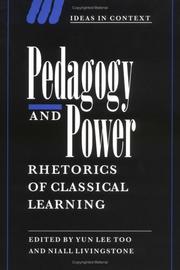
ISBN: 0521594359 0521038014 0511552734 Year: 1998 Volume: 50 Publisher: Cambridge Cambridge University press
Abstract | Keywords | Export | Availability | Bookmark
 Loading...
Loading...Choose an application
- Reference Manager
- EndNote
- RefWorks (Direct export to RefWorks)
Pedagogy and Power is a volume of interdisciplinary essays which explores the political dimensions of Graeco-Roman education and of its subsequent models. Seeking to make the various structures and discourses of intellectual authority more apparent, the essays argue that there is a social context for the knowledge imparted by classical models of pedagogy. They examine how such pedagogues instruct their pupils to function as citizens who rule or are ruled, privileging certain knowledge over others, and including some individuals while excluding others. Overall the book shows that the complex and plural authorities and power that have been associated with classical learning and knowledge are not part of a legacy to be unproblematically inherited or reproduced.
Classical education --- Education, Classical --- Education --- Education, Humanistic --- Humanism --- Humanities --- Political aspects --- Social aspects --- Historische en vergelijkende pedagogiek. --- Political aspects. --- Social aspects. --- Enseignement classique --- Aspect politique --- Aspect social --- Arts and Humanities --- History
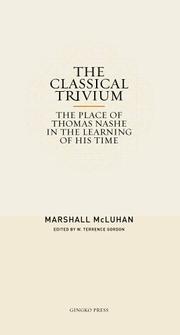
ISBN: 1584230673 9781584230670 Year: 2005 Publisher: Corte Madera, CA Gingko Press
Abstract | Keywords | Export | Availability | Bookmark
 Loading...
Loading...Choose an application
- Reference Manager
- EndNote
- RefWorks (Direct export to RefWorks)
Education --- Classical education --- Knowledge and learning --- Intellectual life --- England --- History, 16th century --- Nash, Thomas --- Nash, Thomas, --- Education, Classical --- Education, Humanistic --- Humanism --- Humanities --- History --- Nashe, Thomas, --- Nash, T. --- Nashe, T. --- Marphoreus, --- Curriknave, Cutbert, --- Curry-Knave, Cutbert, --- Knowledge and learning.
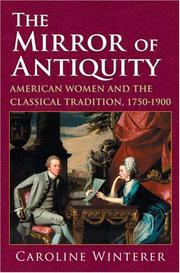
ISBN: 1501711555 9781501711558 9780801441639 0801441633 9780801475795 0801475791 Year: 2018 Publisher: Ithaca, NY : Cornell University Press,
Abstract | Keywords | Export | Availability | Bookmark
 Loading...
Loading...Choose an application
- Reference Manager
- EndNote
- RefWorks (Direct export to RefWorks)
In The Mirror of Antiquity, Caroline Winterer uncovers the lost world of American women's classicism during its glory days from the eighteenth through the nineteenth centuries. Overturning the widely held belief that classical learning and political ideals were relevant only to men, she follows the lives of four generations of American women through their diaries, letters, books, needlework, and drawings, demonstrating how classicism was at the center of their experience as mothers, daughters, and wives. Importantly, she pays equal attention to women from the North and from the South, and to the ways that classicism shaped the lives of black women in slavery and freedom.In a strikingly innovative use of both texts and material culture, Winterer exposes the neoclassical world of furnishings, art, and fashion created in part through networks dominated by elite women. Many of these women were at the center of the national experience. Here readers will find Abigail Adams, teaching her children Latin and signing her letters as Portia, the wife of the Roman senator Brutus; the Massachusetts slave Phillis Wheatley, writing poems in imitation of her favorite books, Alexander Pope's Iliad and Odyssey; Dolley Madison, giving advice on Greek taste and style to the U.S. Capitol's architect, Benjamin Latrobe; and the abolitionist and feminist Lydia Maria Child, who showed Americans that modern slavery had its roots in the slave societies of Greece and Rome. Thoroughly embedded in the major ideas and events of the time-the American Revolution, slavery and abolitionism, the rise of a consumer society-this original book is a major contribution to American cultural and intellectual history.
Women classicists --- Classical education --- Classicism --- Upper class women --- Pseudo-classicism --- Aesthetics --- Literature --- Civilization, Classical --- Education, Classical --- Education --- Education, Humanistic --- Humanism --- Humanities --- Women --- Classicists --- Women scholars --- History --- Intellectual life --- United States --- Civilization --- Classical influences.
Book
ISBN: 9789004512504 9789004513532 9004512500 Year: 2022 Publisher: Leiden: Brill,
Abstract | Keywords | Export | Availability | Bookmark
 Loading...
Loading...Choose an application
- Reference Manager
- EndNote
- RefWorks (Direct export to RefWorks)
Written between 386 and 390 during the excitement of his discovery of Neoplatonism, Augustine's correspondence with his friend Nebridius is a distillation of Platonic questions concerning the infinite, the distinction between sensible and intelligible phenomena, the imagination and recollection, inspired dreams, assimilation to God, the "vehicle" of the soul, interiority, and individuality. In addition, the exchange contains major theological insights concerning the Incarnation and the Trinity. Thanks to these letters, which, as Nebridius himself says, make "Christ, Plato, and Plotinus heard," we can better understand this incandescent moment in Augustine's life when he converted to both philosophy and Christianity, as the Confessions will later testify.
Classical education --- Classical literature --- Literature, Classical --- Literature --- Literature, Ancient --- Greek literature --- Latin literature --- Education, Classical --- Education --- Education, Humanistic --- Humanism --- Humanities --- Christian literature, Early --- Christian philosophy. --- Littérature chrétienne primitive. --- Augustine, --- Nebridius --- Plato --- Augustine, - of Hippo, Saint, - 354-430 --- Nebridis
Book
ISBN: 9789004453463 9789004453470 9004453466 Year: 2022 Publisher: Leiden ; Boston : Brill,
Abstract | Keywords | Export | Availability | Bookmark
 Loading...
Loading...Choose an application
- Reference Manager
- EndNote
- RefWorks (Direct export to RefWorks)
How do you insert yourself into an artistic canon? How do you establish yourself as a worthy successor to your predecessors while making your own mark on a genre? How do you police a genre's boundaries to keep out the unwanted? With particular attention to authorial and national identity, artistic self-definition, and literary reception, this volume shows how four ancient Latin poets-Lucilius, Horace, Persius, and Juvenal-asked and answered these questions between the second century BCE and the second century CE as they invented and reinvented the genre of Roman verse Satire.
Classical literature --- Classical education --- Classical philology --- Philology, Classical --- Classical antiquities --- Greek language --- Greek literature --- Greek philology --- Humanism --- Latin language --- Latin literature --- Latin philology --- Education, Classical --- Education --- Education, Humanistic --- Humanities --- Literature, Classical --- Literature --- Literature, Ancient --- Satire, Latin
| Listing 1 - 10 of 25 | << page >> |
Sort by
|

 Search
Search Feedback
Feedback About UniCat
About UniCat  Help
Help News
News